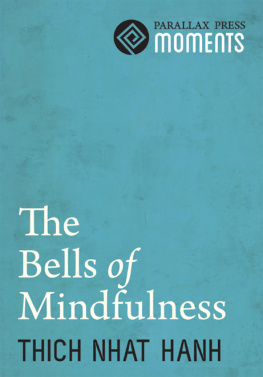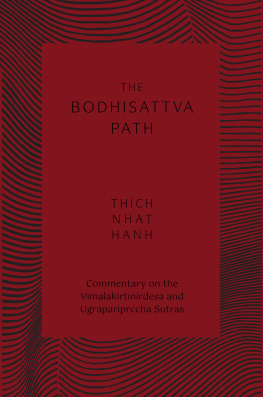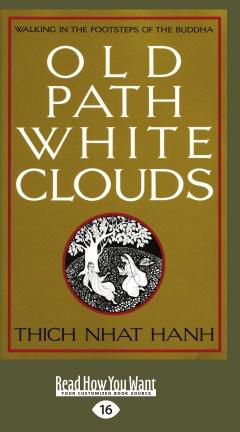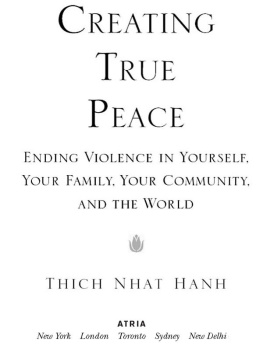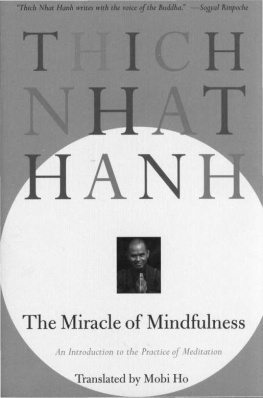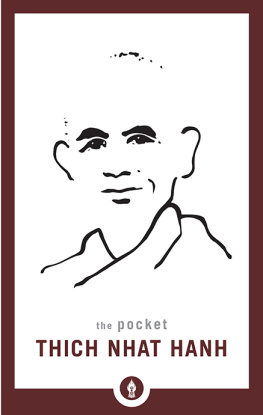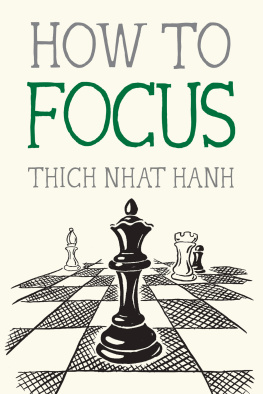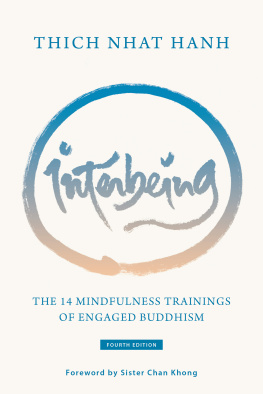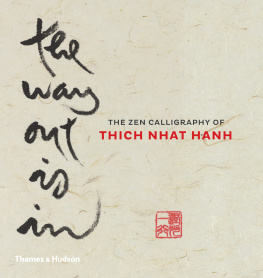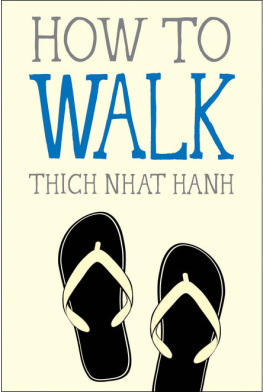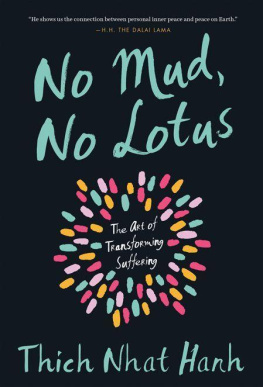Thich Nhat Hanh - The Bells of Mindfulness
Here you can read online Thich Nhat Hanh - The Bells of Mindfulness full text of the book (entire story) in english for free. Download pdf and epub, get meaning, cover and reviews about this ebook. year: 2013, publisher: Parallax Press, genre: Religion. Description of the work, (preface) as well as reviews are available. Best literature library LitArk.com created for fans of good reading and offers a wide selection of genres:
Romance novel
Science fiction
Adventure
Detective
Science
History
Home and family
Prose
Art
Politics
Computer
Non-fiction
Religion
Business
Children
Humor
Choose a favorite category and find really read worthwhile books. Enjoy immersion in the world of imagination, feel the emotions of the characters or learn something new for yourself, make an fascinating discovery.
- Book:The Bells of Mindfulness
- Author:
- Publisher:Parallax Press
- Genre:
- Year:2013
- Rating:4 / 5
- Favourites:Add to favourites
- Your mark:
- 80
- 1
- 2
- 3
- 4
- 5
The Bells of Mindfulness: summary, description and annotation
We offer to read an annotation, description, summary or preface (depends on what the author of the book "The Bells of Mindfulness" wrote himself). If you haven't found the necessary information about the book — write in the comments, we will try to find it.
The Bells of Mindfulness — read online for free the complete book (whole text) full work
Below is the text of the book, divided by pages. System saving the place of the last page read, allows you to conveniently read the book "The Bells of Mindfulness" online for free, without having to search again every time where you left off. Put a bookmark, and you can go to the page where you finished reading at any time.
Font size:
Interval:
Bookmark:
Mindfulness
THICH NHAT HANH

PARALLAX
PRESS
Berkeley, California
The bells of mindfulness are sounding. All over the Earth, we are experiencing floods, droughts, and massive wildfires. Sea ice is melting in the Arctic and hurricanes and heat waves are killing thousands. The forests are fast disappearing; the deserts are growing; species are becoming extinct every day; and yet we continue to consume, ignoring the ringing bells.
All of us know that our beautiful green planet is in danger. Our way of walking on the Earth has a great influence on animals and plants. Yet we act as if our daily lives have nothing to do with the condition of the world. We are like sleepwalkers, not knowing what we are doing or where we are heading. Whether we can wake up or not depends on whether we can walk mindfully on our Mother Earth. The future of all life, including our own, depends on our mindful steps. We have to hear the bells of mindfulness that are sounding all across our planet. We have to start learning how to live in a way that a future will be possible for our children and our grandchildren.
I have sat with the Buddha for a long time and consulted him about the issue of global warming, and the teaching of the Buddha is very clear: If we continue to live as we have been livingconsuming without thinking of the future, destroying our forests and emitting dangerous amounts of carbon dioxidethen devastating climate change is inevitable. Much of our ecosystem will be destroyed. Sea levels will rise and coastal cities will be inundated, forcing hundreds of millions of refugees from their homes, creating wars and outbreaks of infectious disease.
We need a kind of collective awakening. There are among us men and women who are awakened, but their awakening is not enough; most people are still sleeping. We have constructed a system we cant control. It imposes itself on us, and we become its slaves and victims. For most of us who want to have a house, a car, a refrigerator, a television, and so on, we must sacrifice our time and our lives in exchange. We are constantly under the pressure of time. In former times, we could afford three hours to drink one cup of tea, enjoying the company of our friends in a serene and spiritual atmosphere. We could organize a party to celebrate the blossoming of one orchid in our garden. But today we can no longer afford these things. We say that time is money. We have created a society in which the rich become richer and the poor become poorer, and in which we are so caught up in our own immediate problems that we cannot afford to be aware of what is going on with the rest of the human family or our planet Earth. In my mind I see a group of chickens in a cage disputing over a few seeds of grain, unaware that in a few hours they will all be killed.
People in China, India, Vietnam, and other developing countries are still dreaming the American dream, as if that dream were the ultimate goal of mankindeveryone has to have a car, a bank account, a cell phone, or a television set of their own. In twenty-five years the population of China will be more than 1.5 billion people, and if each of them wants to drive their own private car, China will need more than 99 million barrels of oil every day. But world production is only 84 million barrels per day. So the American dream is not possible for the people of China, India, or Vietnam. The American dream is no longer even possible for Americans. We cant continue to live like this. Its not a sustainable economy.
We have to have another dreamthe dream of brotherhood and sisterhood, of loving kindness and compassion. That dream is possible right here and now. We have the Dharma; we have the means; and we have enough wisdom to be able to live this dream. Mindfulness is at the heart of awakening, of enlightenment. We practice breathing to be able to be here in the present moment so that we can recognize what is happening in us and around us. If whats happening inside us is despair, we have to recognize that and act right away. We may not want to confront that mental formation, but its a reality, and we have to recognize it in order to transform it.
We dont have to sink into despair about global warming; we can act. If we just sign a petition and forget about it, it wont help much. Urgent action must be taken at the individual and the collective levels. We all have a great desire to be able to live in peace and to have environmental sustainability. What most of us dont yet have are concrete ways of making our commitment to sustainable living a reality in our daily lives We havent organized ourselves. We cant only blame our governments and corporations for the chemicals that pollute our drinking water, for the violence in our neighborhoods, or for the wars that destroy so many lives. Its time for each of us to wake up and take action in our own lives.
We witness violence, corruption, and destruction all around us. We all know that the laws we have in place arent strong enough to control the superstition, cruelty, and abuses of power that we see daily. Only faith and determination can keep us from falling into deep despair.
Buddhism is the strongest form of humanism we have. It can help us learn to live with responsibility, compassion, and loving kindness. Every Buddhist practitioner should be a protector of the environment. We have the power to decide the destiny of our planet. If we awaken to our true situation, there will be a change in our collective consciousness. We have to do something to wake people up. We have to help the Buddha to wake up the people who are living in a dream.
Sometimes we need a sound to remind us to return to our conscious breathing, we call these sounds bells of mindfulness. In Plum Village and the other practice centers in my tradition, we stop whenever we hear the telephone ringing, the clock chiming, or the monastery bell sounding. These are our bells of mindfulness. When we hear the sound of the bell, we stop talking and stop moving. We relax our body and become aware of our breathing. We do it naturally, with enjoyment, and without solemnity or stiffness. When we stop to breathe and restore our calm and our peace, we become free, our work becomes more enjoyable, and the friend in front of us becomes more real.
Sometimes our bodies may be home, but were not truly home. Our minds are elsewhere. The bell can help bring the mind back to the body. Thats how we practice in a temple. Because the bell can help us to go back to ourselves, back to the present moment, we consider the bell to be a friend, a bodhisattva that helps us to wake up to ourselves again.
At home, we can use the ringing of the telephone, the local church bells, the cry of a baby, or even the sound of a siren or a car alarm as our bells of mindfulness. With just three conscious breaths we can release the tension in our body and mind and return to a cool, clear state of being.
In Vietnam, I was used to hearing the sound of the Buddhist temple bell. When I came to the West there was no Buddhist bell; I only heard the church bell. One day when Id been in Europe for several years, I was doing walking meditation in Prague. Suddenly I heard the sound of the church bell, and for the first time I was able to touch deeply the soul of ancient Europe. Since then, every time I hear the church bell, whether its in Switzerland or France or Russia, I deeply touch the soul of Europe. For those of us who dont train ourselves, the sound of the bell doesnt mean much. But if we train ourselves, the sound will have a very spiritual meaning for us, and will wake up the most wonderful things inside us.
In our tradition, we dont say striking the bell; we say inviting the bell to sound. And the person who invites the bell is the bell master. We call the wooden stick that invites the bell, the inviter.
Font size:
Interval:
Bookmark:
Similar books «The Bells of Mindfulness»
Look at similar books to The Bells of Mindfulness. We have selected literature similar in name and meaning in the hope of providing readers with more options to find new, interesting, not yet read works.
Discussion, reviews of the book The Bells of Mindfulness and just readers' own opinions. Leave your comments, write what you think about the work, its meaning or the main characters. Specify what exactly you liked and what you didn't like, and why you think so.

